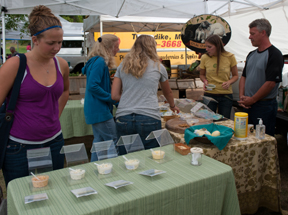Farmers’ Market . . . Think Food Safety
 Beth Calder, Extension Food Science Specialist
Beth Calder, Extension Food Science Specialist
Contact information: beth.calder@maine.edu or 207.581.2791
Farmers’ Markets are a great way to connect with local consumers and tourists interested in buying local produce and value-added food products. Farmers, vendors, and consumers can do their part in making sure proper food handling practices are followed for a safe and enjoyable Farmers Market season.
Temperature danger zone
Summer temperatures are enjoyable for us and bacteria (that may potentially cause food-borne illness) grow extremely well at these temperatures. Be aware that perishable foods (foods that need to be refrigerated) should not be left out in the hot sun on the market table or in a hot car. The temperature danger zone is 40 to 140 degrees Fahrenheit. If perishable foods are left at this temperature for over 2 hours, they should be thrown away because they are not safe to eat. Potentially harmful bacteria can grow rapidly in this temperature range. Perishable foods should be transported cold in a cooler on ice. Coolers and ice packs can be purchased locally at most stores and are inexpensive.
Keep cold foods cold
Food products that require refrigeration such as milk, dairy products, baked goods with dairy-based frostings (such as cream cheese frosting) or cream-based fillings, meat, poultry and even eggs should be kept cool and should not be left out in the hot sun. These foods should be placed in a cooler at temperatures below 40 degrees. Eggs need to be at 45 degrees or colder. Bring a reliable thermometer that can be periodically calibrated to keep track of the temperatures in your cooler.
Personal Hygiene
Sometimes our own hands and clothing can transfer harmful bacteria. Be sure to wear clean clothes and keep your hands clean. Shaking hands, touching money, petting animals, handling children, touching soiled vegetables or utensils can transfer bacteria to your food products and samples. Bring along hand sanitizer and/or hand sanitizer wipes and/or wear food service gloves to keep your food products clean and safe for your consumers. Use proper hand-washing techniques before handling food. Wash hands for 20 seconds with warm, soapy water and dry hands on single use, disposable paper towels.
Samples
 If you are giving away food samples, prepare them ahead of time in a sanitary manner (with clean utensils and clean hands) and be sure that any surface that touches food products is clean and sanitized. Samples can be placed in individual serving cups or packages, or they can be displayed under a dome or covered tray at the market. When appropriate, disposable utensils such as toothpicks, deli paper, plastic forks and spoons, and disposable cups must be provided for proper food handling of samples. If you are selling perishable items, rotate your food samples. Do not leave them out at room temperature for longer than 2 hours. Keep these products on ice whenever possible.
If you are giving away food samples, prepare them ahead of time in a sanitary manner (with clean utensils and clean hands) and be sure that any surface that touches food products is clean and sanitized. Samples can be placed in individual serving cups or packages, or they can be displayed under a dome or covered tray at the market. When appropriate, disposable utensils such as toothpicks, deli paper, plastic forks and spoons, and disposable cups must be provided for proper food handling of samples. If you are selling perishable items, rotate your food samples. Do not leave them out at room temperature for longer than 2 hours. Keep these products on ice whenever possible.
If you need to bring cutting utensils to the market, bring along clean potable water and dish detergent to wash and rinse utensils. You should also bring along clean potable water with sanitizer added such as Clorox® (50-200ppm; which is 3/4 tsp. but no more than 3 tsp. of bleach in 1 gallon of clean water) to sanitize after washing. When purchasing bleach for a sanitizer, purchase unscented, plain bleach.
Food Licensing
The Maine Department of Agriculture, Quality Assurance and Regulations requires farmers and food vendors to obtain a Mobile Food Vendor’s License when fruits and vegetables are sliced, peeled, husked or processed in any way. Fruits and vegetables, when cut and processed, cannot be prepared in a home kitchen because they are at a higher risk for possible contamination of harmful bacteria and need to be prepared in a sanitary manner. Due to this higher risk, these perishable products need to be processed in a separate, commercial food processing area approved by the Maine Department of Agriculture for the processing of fruit and vegetable products and requires a Commercial Food Processor’s License.
Baked goods, jams and jellies, and pickled foods can be processed safely in a home kitchen and would require a Home Food Processors License and a Mobile Food Vendor’s License if you are selling these products at the Farmers Markets. If you have questions regarding food licenses, please contact Steve Giguere at 207.287.3841 or e-mail steve. giguere@maine.gov. Food license applications can be accessed at the Maine Department of Agriculture, Food and Rural Resources Web page: Licenses and Permit Forms.
Value-Added Food Product Assistance
Recipe to Market: How to Start a Specialty Food Business in Maine, Bulletin #3101, helps answer commonly asked questions on how to start a food business and contains the necessary steps and contact information, and includes what resources and food testing are available at the University of Maine.
